Cazhhmere welcomes the Urbanology team into her apartment with outstretched arms. “Welcome, welcome, come on in,” she says as she reaches in for a hug. (Note, this is pre-pandemic.) Donned in a black hoodie, gold chains and dark jeans with a pair of all-black Timbs, she motions for us to hand her our coats and ushers us into her living room. Seated on her sofa, a view of the city’s lake shore can be seen from her grand window. She sits down and her French bulldog puppy Feta scurries closely behind. “I’m glad we get a chance to do this,” she says.
Regarded by many as one of Canada’s busiest music video directors, Cazhhmere has taken the industry by storm over the last 17 years. With hundreds of music videos under her belt, Cazhhmere has proven she is a force to be reckoned with. She has worked with many artists including JRDN, Melanie Fiona, Royce Da 5’9, Kardinal Offishall and Classified.
Unafraid of risks Cazhhmere recently began her transition out of the music video world to explore other areas of filmmaking. She teamed up with CBC to write and direct her debut documentary Deeply Rooted about her family’s history in Canada. She is currently in post-production on several film and television projects. Screenwriting, filmmaking and directing — it’s a combination of specialities that makes Cazhhmere a triple threat.
While she is now comfortable among the upper echelon of award-winning Canadian directors, Cazhhmere’s career began far more humbly as an intern working inside MuchMusic’s urban music department in 2003. Cazhhmere sat down to reflect on a storied career and making the pivot to new endeavours for the future.
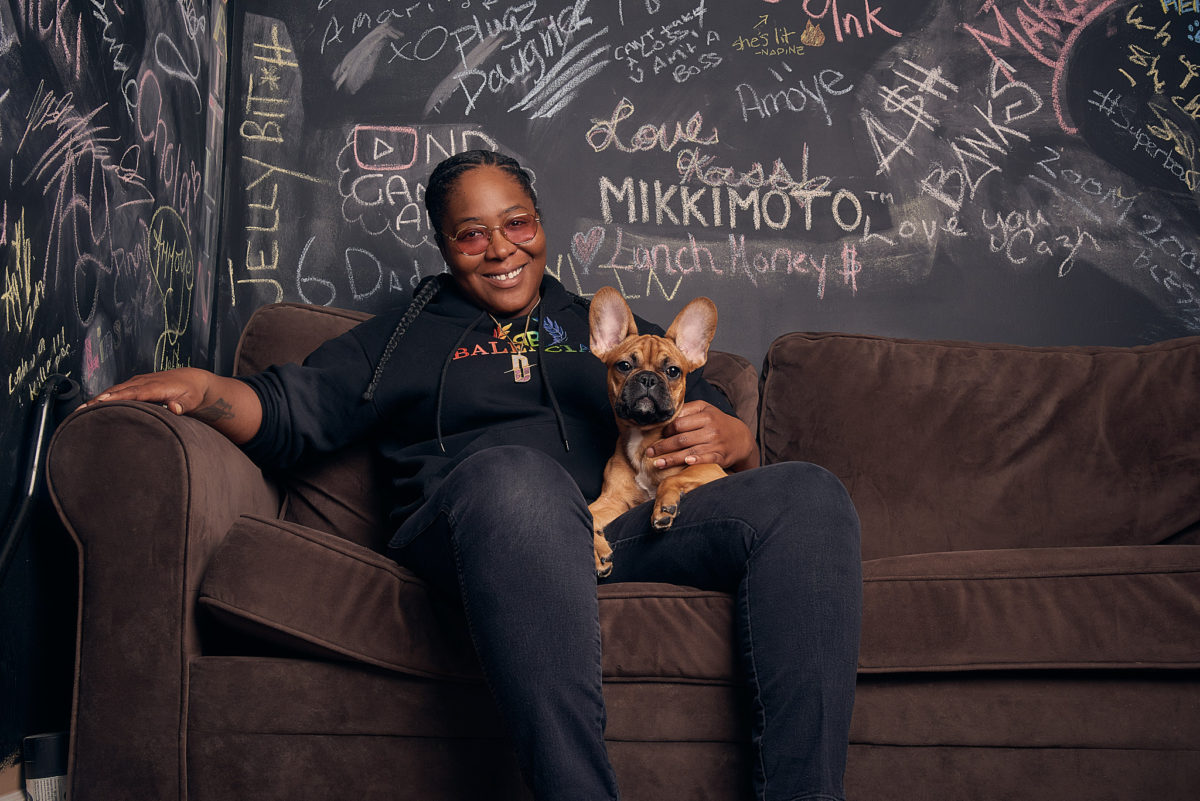
Art and film give me a voice.
Can you describe your experience interning at MuchMusic? How did you work your way up in the film and music industries?
MTV and MuchMusic in their respective countries were like the end all be all for all things music entertainment. It wasn’t just playing music videos. There were live shows, live performances, live guests would come in. MuchMusic had three urban shows — I interned for that whole department and at the time it was an all-female crew. When I was interning there, a good friend of mine by the name of RT! was interning upstairs, at MuchMoreMusic. We were just two young Black kids in a white person’s world and you know how that goes, ‘you look like me. I look like you. Let’s hang together.’ We had all the ambitions of making music videos and being cool. People we looked up to were like Hype Williams, Little X (now Director X), Spike Lee. RT! decided to start a production company to make music videos and I just kind of followed his lead … There wasn’t ever a thought like ‘oh, this might be a bumpy ride.’ I never had intentions of everything happening overnight, but I never had intentions of what was to come [or] what was ahead of me and the work that would have to be put in to achieve my goals.
How would you say your career has shaped who you are today?
I’d say the biggest way that it’s influenced me is that it taught me confidence and perseverance. I’m a young Black girl from Halifax, Nova Scotia, and I work in a white man’s world. I think it distracted me from the fact that that’s what I was because I never really stopped to think about those things and how difficult that would be in life especially in that world. Music videos were just my focus. It taught me confidence because I was very shy growing up. I’m still very much an introverted person, a lot of artists are, but when you’re a director, or filmmaker you have to talk to people. Also, when you work in anything in art and entertainment there’s a social component to it and I was forced to embrace that. Had I have chosen a different career path in life, I can’t say that it would have turned out the same way. Art and film give me a voice.
You definitely used your artistic abilities to send a powerful message with your feature documentary, Deeply Rooted. What was the inspiration behind that project?
What sparked the idea for the documentary was my Uncle Robbie. He has taken it upon himself to learn our family history. He’s become the family historian, and for years he would send messages and documents about our family tree. One time he sent a message to the family that he had found a cousin in St. Louis [who had] the closest genetic connection to our last enslaved relatives and our first freed relatives on the island of Antigua … They were able to trace a part of her genetic DNA to a point of origin in Africa, which happened to be the Jola tribe in Guinea Bissau, West Africa. It just struck me for some reason, I was like, ‘that’s cool’ … For all you know, I could be a princess, the queen of some village in West Africa and not even know it. My uncle allowed me to have a little bit of who I am, and I thought that was cool.
Your documentary in that sense is similar to the American TV series “Who Do You Think You Are?” since you are able to retrace your ancestral roots through research.
Yeah. Robbie did the research for me and I was like this could be cool. I’m going to make this scintillating docu-series. My idea was to make it the world’s biggest family reunion and retrace our genetic roots all the way back to the motherland and meet relatives that we have all over this country. But projects take time and as artists we come up with projects and projects and then some of them, we never work on. So, it was just the idea in the vault of ideas that’s in my brain.
How did your partnership with the Canadian Broadcast Corporation (CBC) begin?
I got approached by CBC. They said, ‘we’re looking for projects’ and they reached out to me because they knew I’d come through for them. The next day I sent them five ideas. Four of them were music based and then I just threw in [Deeply Rooted]. I explained to them I was born in Halifax, but in [Canada], people ask me all the time where I’m from, especially in Toronto. My family came here as slaves hundreds of years ago [and] I can pull out my native status. Half of me came here hundreds of years ago, the other part of me has been here forever. I just told them in the paragraph if I were to describe my family from a timeline perspective and just tell you the history and key points and things that my family has done and established in this country, but not tell you what race they are, everybody would assume that they are a white Canadian family. I sent a picture of a family reunion from my mom’s side of the family from Truro … It’s CBC, the Canadian Broadcast Corporation, [they] can’t tell me no … [because] I don’t see anything Canadian like this when I watch CBC.
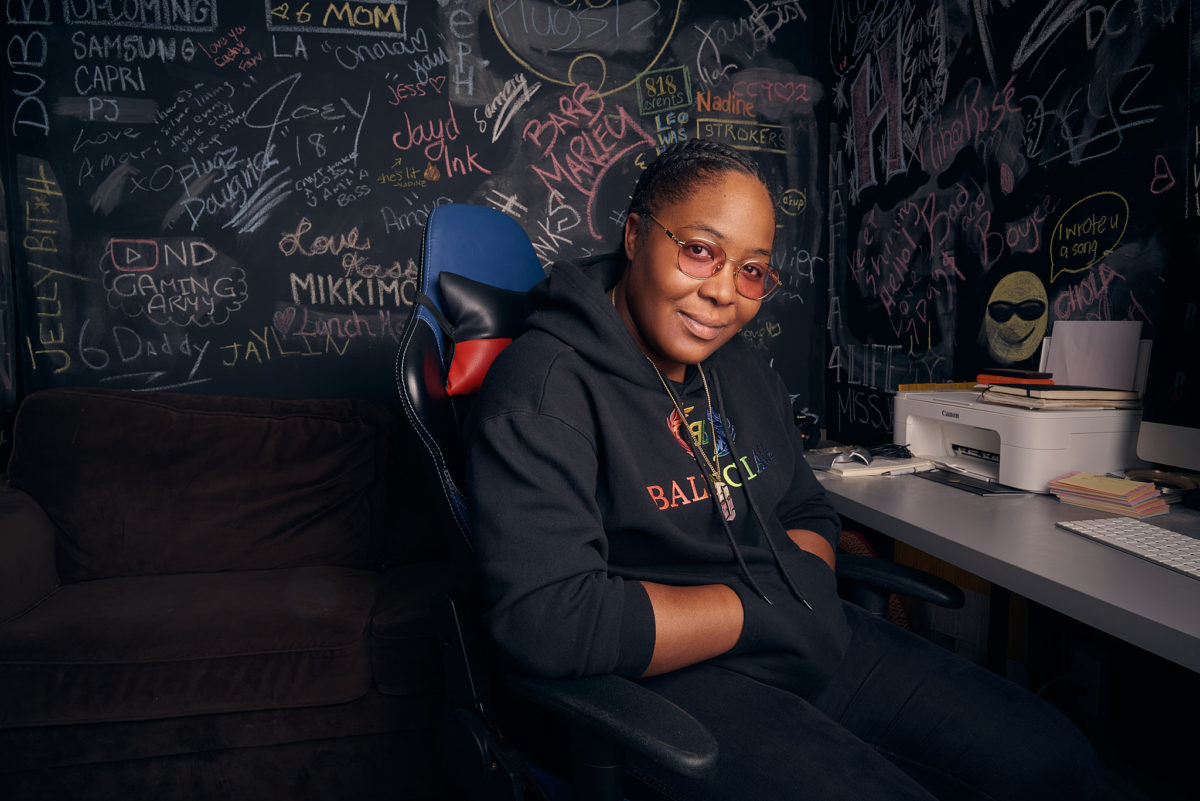
The business of music kind of made me fall out of love with the thing that made me fall in love with what I do in the first place.
Reflecting on your career thus far, were there moments that you look back on now and think ‘I wish I didn’t do that?’ Or maybe you wish you still did it, but you could change something?
I’m a firm believer in everything happening for a reason.
I don’t actually make music videos anymore. When I do, it’s one-off things. I solely write and direct for film and television and commercials.
I left the music video industry for a number of reasons. Internet and technology changed most industries. No industry has suffered more than the music industry and because of that the music industry just became a very different landscape. The business of music kind of made me fall out of love with the thing that made me fall in love with what I do in the first place. I was very content doing music videos and I was also stubborn to the point where I should have thought of pursuing other areas of film a lot sooner than I did. I was really determined to hold onto it, and I think I probably just should have let go of it a lot sooner. But at the same time, everything happens for a reason.
I always say for artists especially to succeed in whatever they’re doing they have to have a really strong support system. Who would you say is a part of your support system and what kind of advice or motivation do they give you to keep going?
The captain of my support system is my mom. I’ve learned a lot from [her] just by observing. My mom had me when she was 21 years old in Halifax, Nova Scotia. My mother put herself through one of the top universities in this country and then moved to a whole new city, pursued a career that has taken her all over the world, to tables and meetings with some of the most important people in the world like Obama and some of the world’s leading Black voices and politicians. She doesn’t let anything stop her and she’s not afraid to take a step to do what needs to be done. I realize that I’m very much like that.
When they offered me my first working contract at MuchMusic, one of my mentors, the head producer of the urban department Petal Baptiste said, ‘you’re Black and you’re a girl, so you’re forever going to have to work 200 times harder than every person in the room,’ and that’s never changed. It’s one of the most important things that someone has ever told me.
Another part of my support system would be my big brother by choice, RT! The art world is a very mean world because everyone’s afraid they’re going to get stepped over, and from the very get go when we first met at MuchMusic all the way till now, he’s never been that type of person. If he ventured into a new area with his journey, he would teach me so that I could prepare myself for that step as well when I get there. He always has my back and is supportive. I’m a young Black girl, and he knows that he’s going to get opportunities presented to him more so than me simply because he’s a guy. But because we’re Black we will always be fighting the same fight. [Since] he does have an advantage on me he always wants to pay it forward and to this day, he’s been one of the biggest players in my support system. I love him tremendously and am forever indebted to him for that.
My family, in general, is very supportive and encouraging of me, which I appreciate. To my family, I’m like Shonda Rhimes already.
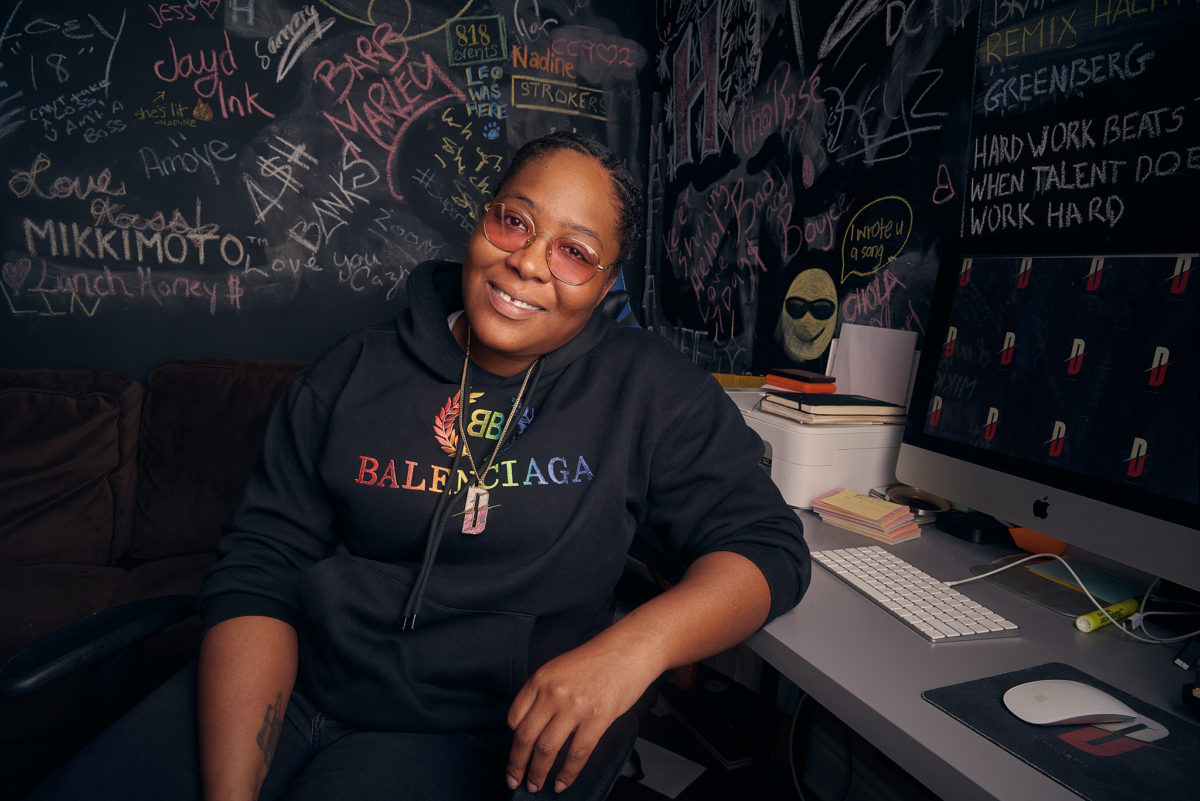
I walk into meetings with a gold grill in my mouth. I am who I am. I get that from Toronto.
How would you say your Nova Scotia and Toronto roots influence your directing style?
It’s bold and unapologetic. Toronto’s been known for decades as the Screwface capital. I think that means we just don’t give a sh*t. It’s like, take me as I am or don’t take me at all. I wear hoodies and Timbs, and a chain with diamonds and sh*t. I walk into meetings with a gold grill in my mouth. I am who I am. I get that from Toronto. Halifax is kind of the same way. Black Scotians are a different breed of people. You [either] love us, or you hate us. I’m good either way. I live my life like that. Take it or leave it.
Directing and screenwriting seems to have always been a passion of yours. Was there ever any other artistic path that interested you early on or was filmmaking and screenwriting it for you?
It’salways been there. As a kid I’d have headphones on listening to music, and I would hear the songs and always see music videos in my head. I was obsessed with Michael Jackson growing up. [He] is the reason I do what I do because I would rather watch his music videos than watch cartoons. Saturday mornings when my mom is telling me she wants to sleep in, I’m putting in Michael Jackson’s Moonwalker VHS tape. Mom had to buy it twice because I watched it so much. I would hear songs and come up with these elaborate Michael Jackson type music videos for any song that I heard. Then I just got into the habit of writing them down in a journal. I grew up saying I want to do this for real life. I’ve always been a writer, always been telling stories as well from a very young age. In hindsight, I realize that I was pretty much born a writer, a storyteller. It just manifested itself in many different ways.
How would you say it’s been for you navigating the Toronto arts community? Do you think that there is enough opportunities for talented artists such as yourself to display their works?
I think in this era of social media and technology there is. For the longest time in our arts community they said Toronto is known as the Screwface capital. There was no sense of togetherness. There were a couple little pockets here and there but overall it was very much dog eat dog. Then things changed and people started coming together and amazing things were happening from that to the point where Toronto [is] on the map — and I’m talking urban Toronto. A lot of people can put that on the Raptors or Drake, but regardless of what it is, it was all about teams and families and other people started following suit. I personally feel like we’re starting to revert back to our old ways. Before there was a moment where it’s like ‘we can all make this dream possible, but we’ve got to all work on it together.’ Now that they know it’s possible, it’s just like we’re reverting back to being crabs in a bucket. We just need to regroup … Regardless of the field, it will always take a f***ing village.
Can you describe what your creative process is when you’re taking on a new project? How do you formulate your ideas and create visual concepts in your mind?
It’s different with every project. Documentary work usually comes from personal experience. If I’m working on a script for a movie my creative process is all over the place because scripts take a long time to write. I spend a lot of time developing my characters, but when it comes to actually writing the script, there’s a lot of work that goes in before I even start writing. Once I start writing the actual script, it’s like I play a lot of make-believe. So, I’m in my home office or in my living room and I’m walking back and forth pretending to be different characters and acting out what I see before I write it.
You mentioned that you have a lot of new things on the horizon. Share a bit more insight about your upcoming projects and what we can expect from you in the future.
Well, I’m researching for a documentary right now with the National Film Board of Canada. This documentary is going to focus more on the struggle and the plight of the Black community in Halifax in the present time. I’m [also] working on my first feature length film. I’m just finalizing the script and we go to picture early next year. I can tell you that it’s a drama, suspense film that takes place in a Black Canadian community and features a predominantly Black cast. It’s a little bit of a thriller that takes place on Halloween night. I’m working on a bunch of different projects in all areas of film except for music videos.
So would you say filmmaking is your full-time passion now?
Even as a music video director, I am still a filmmaker. I’m just changing formats, basically. I’ve always been a filmmaker.
Have you retired from music videos for good?
I don’t know — it’s like a soft retirement.
Photos © Isa Miguel Ransome + Urbanology Magazine

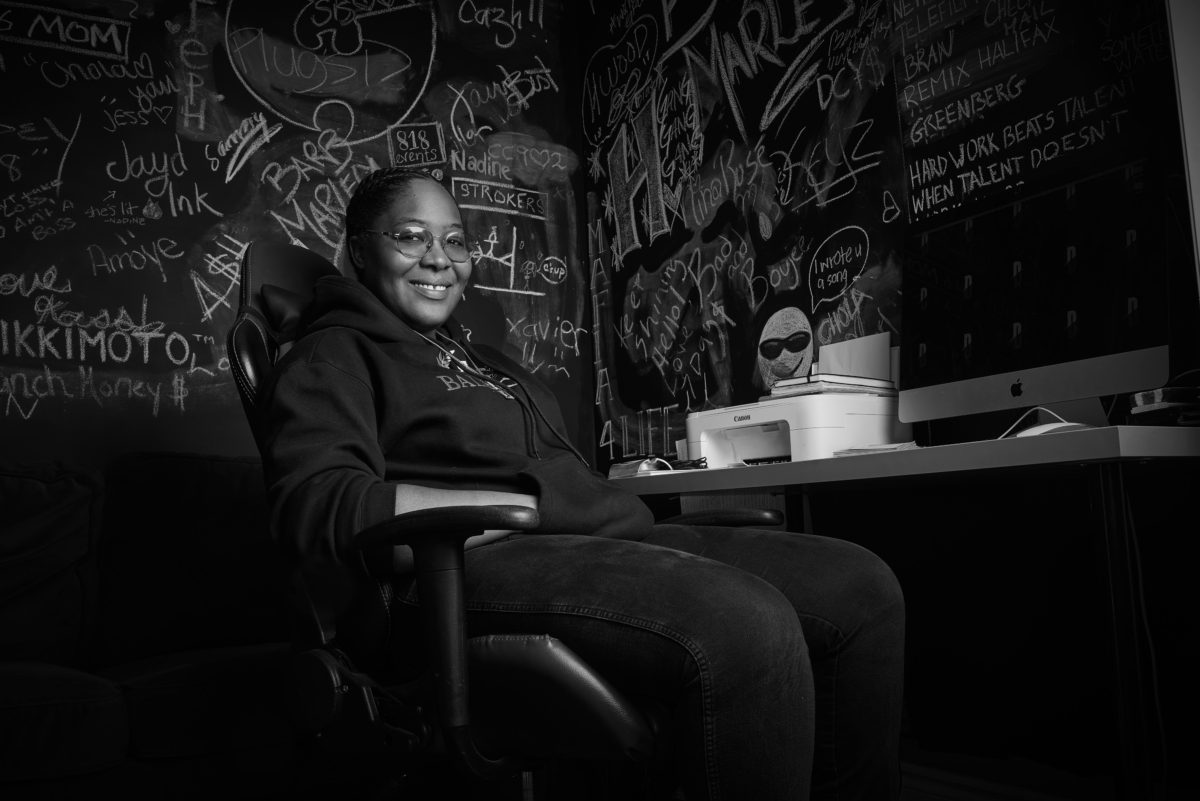
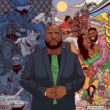

Comments are closed.